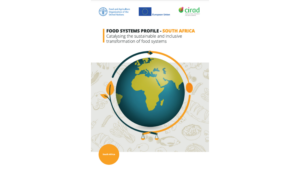
Food systems are intimately linked to our lives – through the food we eat, our nutrition and health, our livelihoods, jobs, and the environment and natural resources of the planet. The main challenge for food systems is to produce nutritious food for all while preserving our biodiversity and environment and ensuring equitable distribution of wealth. This Food Systems Profile provides a summary of the main food system issues in South Africa and highlights potential solutions for their sustainable and inclusive transformation. It is the result of a systemic analysis and stakeholders’ consultation that was part of a global assessment of food systems in over 50 countries, following a joint initiative by the EU, FAO, and CIRAD which aims at catalyzing the sustainable and inclusive transformation of food systems. Last updated 25/05/2022
Cite this content as:



